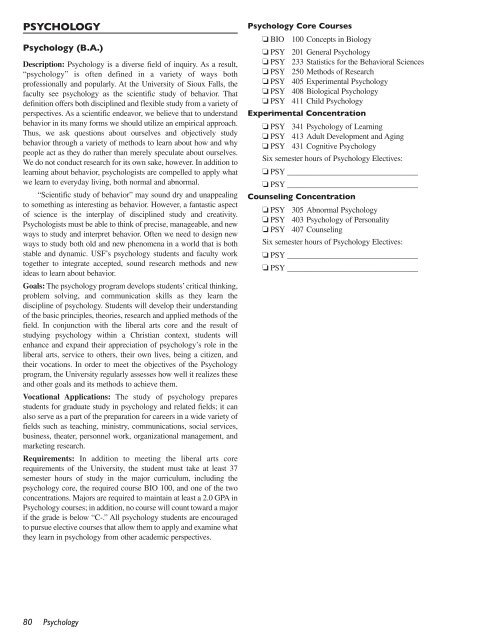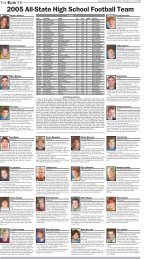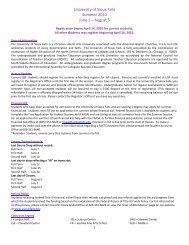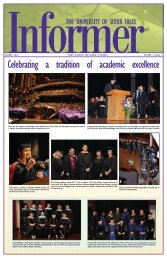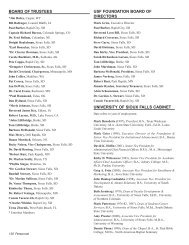USF TELEPHONE DIRECTORY - University of Sioux Falls
USF TELEPHONE DIRECTORY - University of Sioux Falls
USF TELEPHONE DIRECTORY - University of Sioux Falls
Create successful ePaper yourself
Turn your PDF publications into a flip-book with our unique Google optimized e-Paper software.
PSYCHOLOGY<br />
Psychology (B.A.)<br />
Description: Psychology is a diverse field <strong>of</strong> inquiry. As a result,<br />
“psychology” is <strong>of</strong>ten defined in a variety <strong>of</strong> ways both<br />
pr<strong>of</strong>essionally and popularly. At the <strong>University</strong> <strong>of</strong> <strong>Sioux</strong> <strong>Falls</strong>, the<br />
faculty see psychology as the scientific study <strong>of</strong> behavior. That<br />
definition <strong>of</strong>fers both disciplined and flexible study from a variety <strong>of</strong><br />
perspectives. As a scientific endeavor, we believe that to understand<br />
behavior in its many forms we should utilize an empirical approach.<br />
Thus, we ask questions about ourselves and objectively study<br />
behavior through a variety <strong>of</strong> methods to learn about how and why<br />
people act as they do rather than merely speculate about ourselves.<br />
We do not conduct research for its own sake, however. In addition to<br />
learning about behavior, psychologists are compelled to apply what<br />
we learn to everyday living, both normal and abnormal.<br />
“Scientific study <strong>of</strong> behavior” may sound dry and unappealing<br />
to something as interesting as behavior. However, a fantastic aspect<br />
<strong>of</strong> science is the interplay <strong>of</strong> disciplined study and creativity.<br />
Psychologists must be able to think <strong>of</strong> precise, manageable, and new<br />
ways to study and interpret behavior. Often we need to design new<br />
ways to study both old and new phenomena in a world that is both<br />
stable and dynamic. <strong>USF</strong>’s psychology students and faculty work<br />
together to integrate accepted, sound research methods and new<br />
ideas to learn about behavior.<br />
Goals: The psychology program develops students’ critical thinking,<br />
problem solving, and communication skills as they learn the<br />
discipline <strong>of</strong> psychology. Students will develop their understanding<br />
<strong>of</strong> the basic principles, theories, research and applied methods <strong>of</strong> the<br />
field. In conjunction with the liberal arts core and the result <strong>of</strong><br />
studying psychology within a Christian context, students will<br />
enhance and expand their appreciation <strong>of</strong> psychology’s role in the<br />
liberal arts, service to others, their own lives, being a citizen, and<br />
their vocations. In order to meet the objectives <strong>of</strong> the Psychology<br />
program, the <strong>University</strong> regularly assesses how well it realizes these<br />
and other goals and its methods to achieve them.<br />
Vocational Applications: The study <strong>of</strong> psychology prepares<br />
students for graduate study in psychology and related fields; it can<br />
also serve as a part <strong>of</strong> the preparation for careers in a wide variety <strong>of</strong><br />
fields such as teaching, ministry, communications, social services,<br />
business, theater, personnel work, organizational management, and<br />
marketing research.<br />
Requirements: In addition to meeting the liberal arts core<br />
requirements <strong>of</strong> the <strong>University</strong>, the student must take at least 37<br />
semester hours <strong>of</strong> study in the major curriculum, including the<br />
psychology core, the required course BIO 100, and one <strong>of</strong> the two<br />
concentrations. Majors are required to maintain at least a 2.0 GPA in<br />
Psychology courses; in addition, no course will count toward a major<br />
if the grade is below “C-.” All psychology students are encouraged<br />
to pursue elective courses that allow them to apply and examine what<br />
they learn in psychology from other academic perspectives.<br />
80 Psychology<br />
Psychology Core Courses<br />
❏ BIO 100 Concepts in Biology<br />
❏ PSY 201 General Psychology<br />
❏ PSY 233 Statistics for the Behavioral Sciences<br />
❏ PSY 250 Methods <strong>of</strong> Research<br />
❏ PSY 405 Experimental Psychology<br />
❏ PSY 408 Biological Psychology<br />
❏ PSY 411 Child Psychology<br />
Experimental Concentration<br />
❏ PSY 341 Psychology <strong>of</strong> Learning<br />
❏ PSY 413 Adult Development and Aging<br />
❏ PSY 431 Cognitive Psychology<br />
Six semester hours <strong>of</strong> Psychology Electives:<br />
❏ PSY _________________________________<br />
❏ PSY _________________________________<br />
Counseling Concentration<br />
❏ PSY 305 Abnormal Psychology<br />
❏ PSY 403 Psychology <strong>of</strong> Personality<br />
❏ PSY 407 Counseling<br />
Six semester hours <strong>of</strong> Psychology Electives:<br />
❏ PSY _________________________________<br />
❏ PSY _________________________________


